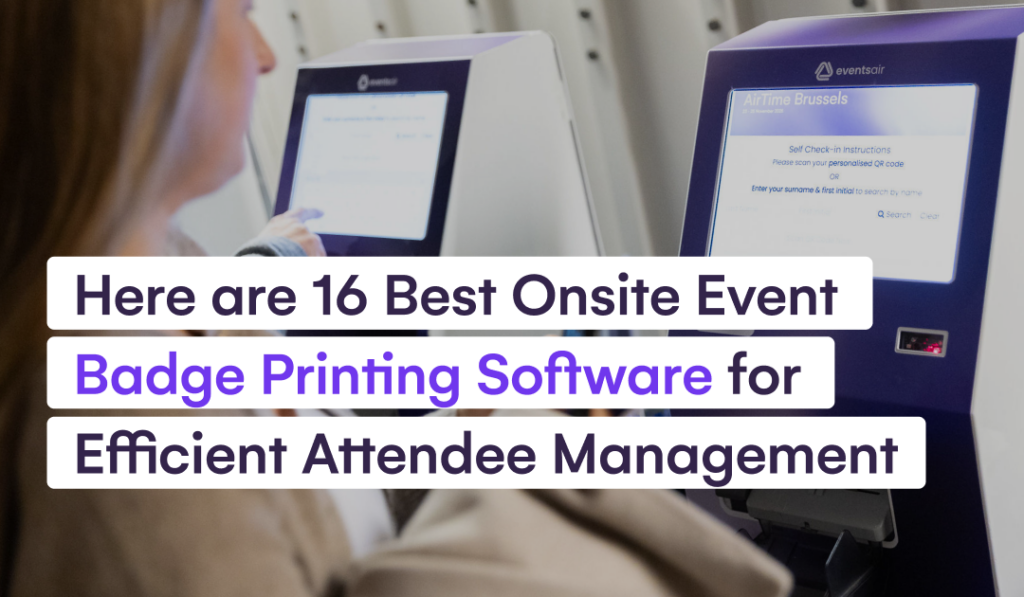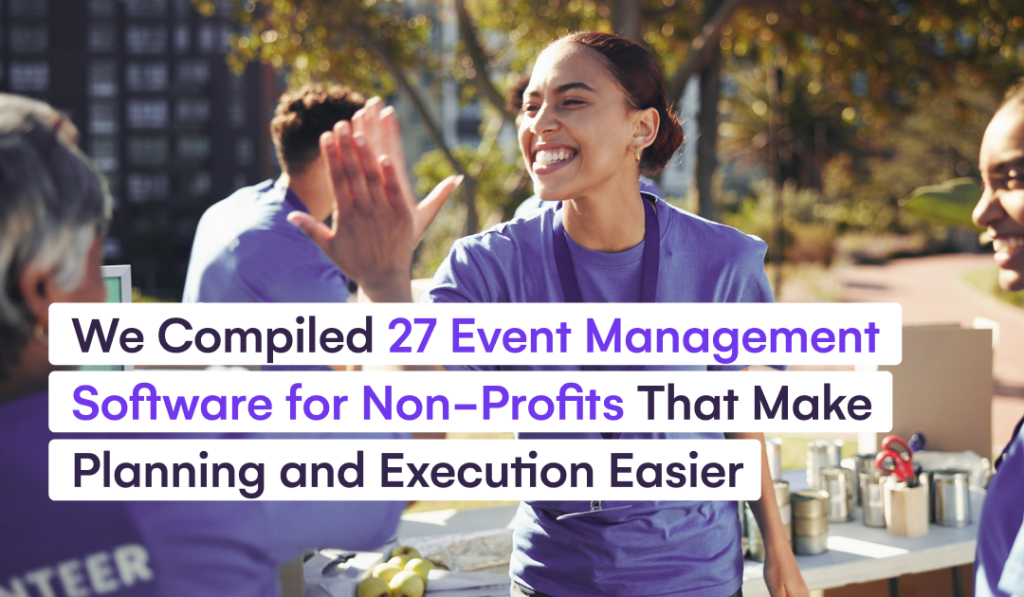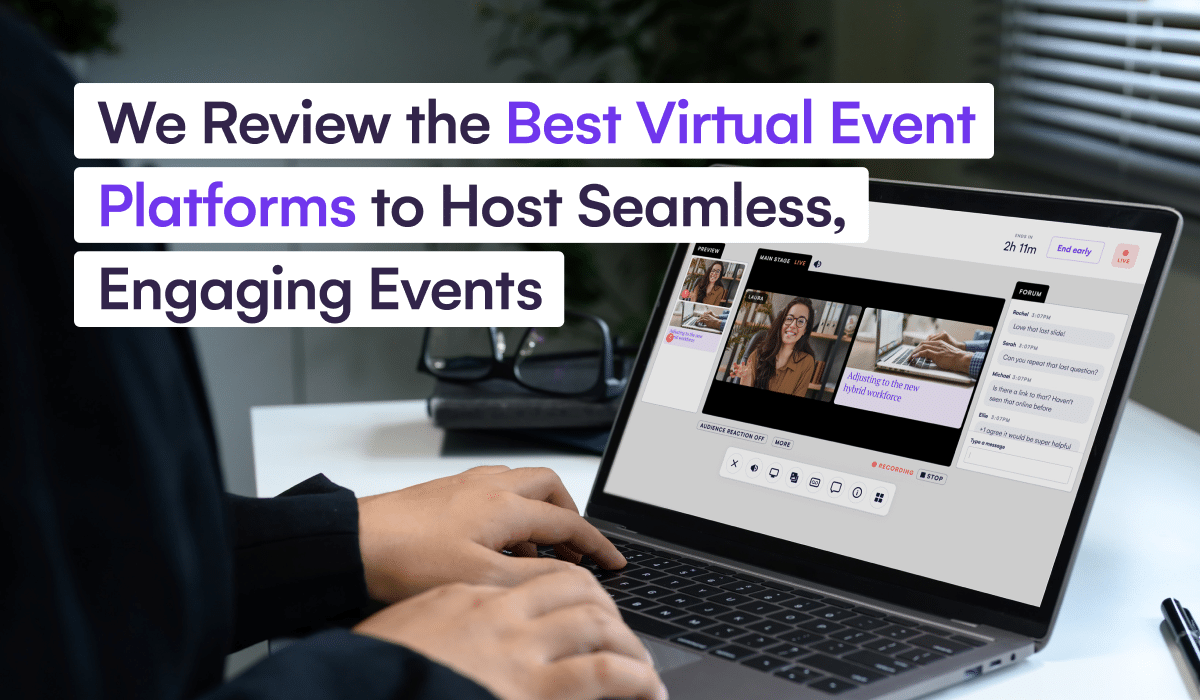
Hosting a virtual event sounds easy until you’re dealing with clunky tools, low engagement, and the stress of managing every segment live. From registrations and streaming to breakout sessions and networking, it’s a lot to coordinate, and one glitch can throw off the entire experience.
That’s where virtual event platforms can make the best out of a stressful situation. The right platform helps you bring everything into one place, so you can focus on delivering a smooth, interactive event that keeps people engaged from start to finish.
In this EventsAir guide, we’ll walk you through the best virtual event platforms to help you deliver a seamless online experience.
What is a virtual event platform?
A virtual event platform is a tool that helps you plan and run events entirely online, from small webinars to large conferences, all in one place.
Instead of using separate apps for registration, streaming, audience interaction, and analytics, virtual event platforms bring everything together in one dashboard. These tools help you manage speakers, schedule sessions, track attendance, and engage attendees with features like live chat, polls, breakout rooms, and virtual networking.

The end goal is to replicate the same energy of physical events and create an interactive virtual experience that keeps your audience connected, no matter where they’re joining from.
Why is a virtual event platform important?
- Centralizes event management: Handle registration, agendas, speakers, engagement, and reporting from one dashboard, no need to juggle multiple tools.
- Creates a smooth attendee experience: From branded event hubs to live chat and session replays, virtual platforms make online events feel seamless and professional.
- Drives real-time engagement: Features like live Q&A, polls, chat, and event gamification keep attendees engaged and active throughout the event.
- Delivers measurable results: Track session attendance, audience interaction, and content performance. Platforms like EventsAir give you real-time insights to refine your future events.
- Flexible for any event size: Whether you’re running a webinar for 50 or a multi-day summit for thousands, virtual platforms can scale up (or down) to fit your needs.
Top 10 virtual event platforms to consider
- EventsAir
- vFairs
- RingCentral
- Cvent
- Eventbrite
- Whova
- Hubilo
- Canapii
- Accelevents
- EventMobi
1. EventsAir – Your comprehensive virtual event platform
EventsAir is an all-in-one event management platform built to deliver engaging virtual event experiences. Our platform combines live streaming, attendee engagement, content delivery, and event management, all in one integrated system. Whether you’re running a small webinar or a global conference, EventsAir gives you the tools to create events that feel seamless and interactive.
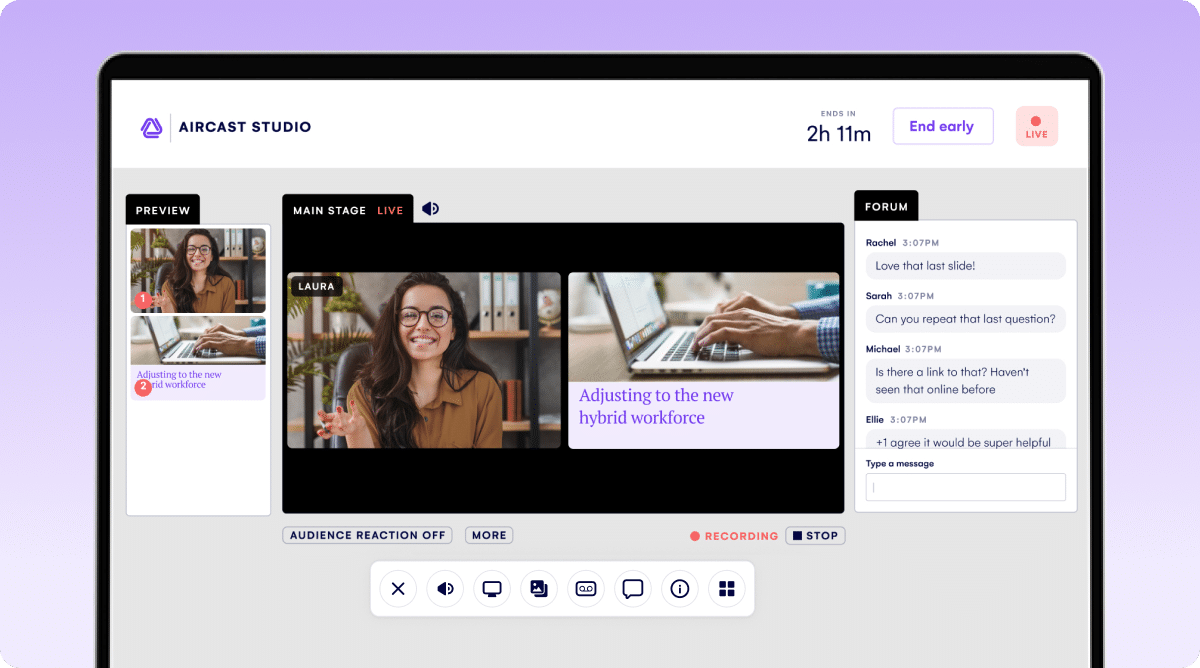
With over 30 years of experience and 350,000+ events powered worldwide, EventsAir is behind some of the world’s most complex and engaging virtual events.
A standout example is Major Events International (MEI), which used our platform to transform its Major Events Summit into a fully virtual conference. With EventsAir, the team delivered 39 sessions over three days, hosted 1,150 delegates from 70 countries, and more than doubled its typical audience, all on one secure platform.
For organizations that can’t risk technical issues or poor user experiences, EventsAir delivers with enterprise-grade security, 24/7 support, and broadcast-level virtual production tools.
Key Features
- Live streaming tools: Broadcast live sessions, switch between multiple camera feeds, and integrate pre-recorded content.
- All-in-one platform: Manage event registrations, speakers, sessions, and engagement for virtual attendees in one place.
- Unified attendee engagement: Keep attendees involved with interactive quizzes, polls, live chat, networking, and gamification.
- Custom registration workflows: Build tailored registration forms with conditional logic and multiple payment options.
- Branded mobile apps: Offer attendees a custom-branded app for agendas, speaker info, networking, and push notifications.
- Lead capture tools: Help sponsors and exhibitors capture and manage leads during virtual expos.
- Comprehensive analytics: Monitor attendance, engagement levels, and ROI with real-time dashboards and post-event reports.
- Event marketing suite: Build event microsites, send targeted email campaigns, and track performance across channels.
- CRM & marketing integrations: Easily connect with Salesforce, HubSpot, Dynamics 365, and other marketing tools.
Pros
- Complete virtual event management in one platform
- Professional-grade streaming and broadcast support
- Advanced analytics for measuring ROI and engagement
- Robust attendee engagement features
- Scalable for both small virtual events and large global summits
- 24/7 support from experienced event tech specialists
Cons
- Website builder customization options could be more flexible
2. vFairs
vFairs is a virtual event platform known for its immersive 3D environments and comprehensive features that support online and in-person events. The platform is widely used for virtual job fairs, trade shows, expos, and conferences, offering organizers the tools to create engaging, interactive experiences for remote attendees.
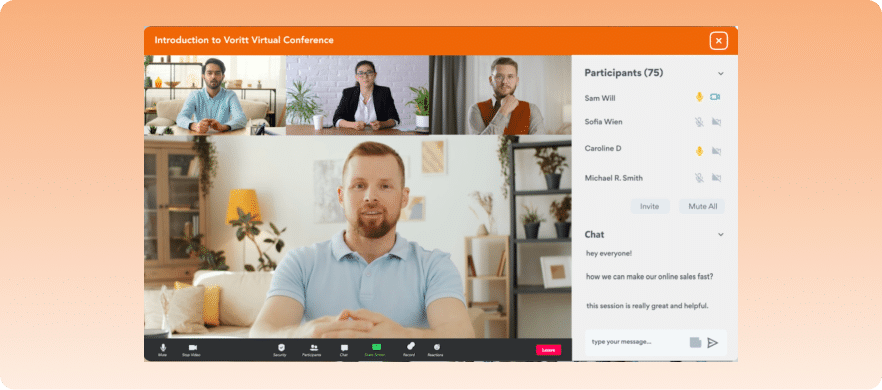
With vFairs, you can replicate the energy of physical events through virtual lobbies, exhibitor halls, auditoriums, and networking lounges, all customizable to reflect your brand.
Key Features
- 3D virtual spaces: Design branded lobbies, booths, and auditoriums that mirror the look and feel of real events.
- Interactive booths: Let attendees explore virtual exhibitor booths with live chat, video demos, and downloadable resources.
- Built-in streaming: Host webinars, panels, and keynotes with live Q&A, polls, and chat all in one place.
- Smart matchmaking: Connect attendees and exhibitors using AI-powered interest filters for better networking.
- Post-event insights: Track attendance, booth visits, downloads, and engagement with detailed reports.
Pros
- Immersive virtual spaces that feel like real event venues
- Strong tools for exhibitors and sponsors to capture leads
- Reliable support team from pre-event setup to post-event wrap-up
- Built-in networking features like video chats, group chat, and discussion boards
Cons
- Some design templates have limited customization options
- Occasional lag in chat or networking features during peak times
- Not all webinar formats are supported, which may limit presenter flexibility
3. RingCentral
RingCentral Events (formerly Hopin Events) is an event management platform that helps you host virtual conferences and events. It’s a great fit for businesses already using RingCentral’s tools and looking to add events without juggling multiple platforms.
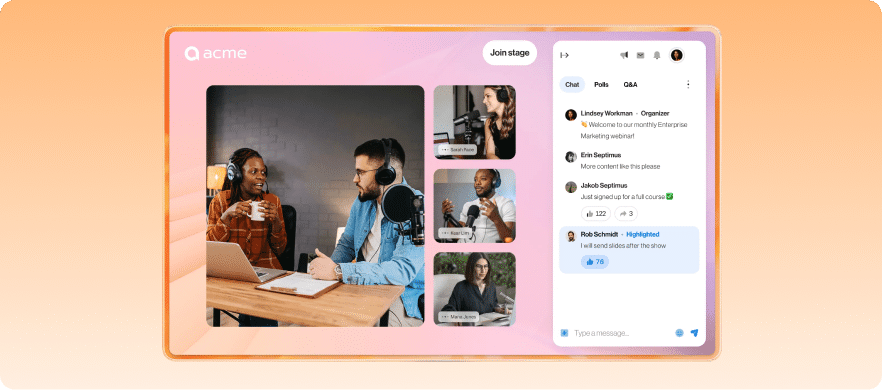
The platform supports branded virtual venues, live sessions, and interactive networking, making it an ideal choice for teams that need a flexible, all-in-one solution that works well for occasional events.
Key Features
- Interactive networking: Connect attendees with 1-on-1 video calls, speed networking, and group chats.
- Built-in streaming: Run live sessions, breakout rooms, or pre-recorded presentations all within the platform.
- Custom branding: Make your event feel like your own with branded colors, logos, and layouts.
- Lead generation tools: Help sponsors and exhibitors track booth visits and connect with attendees.
- Analytics dashboard: Monitor attendance, engagement, and session performance in real time.
Pros
- High-quality streaming for webinars and live sessions
- Strong engagement features like polls, chat, and networking tools
- Custom branding options with flexible layout controls
- Easy integration with RingCentral’s CRM and marketing tools
Cons
- Fewer moderation tools for managing large sessions
- Onboarding may take time for new users unfamiliar with the platform
- Limited integration with apps outside the RingCentral ecosystem
4. Cvent
Cvent is a long-standing name in event tech, trusted by enterprise teams to run large, complex events, both in person and online. Its virtual event tools cover everything from registration and branded event hubs to content delivery and post-event reporting, all in one platform.
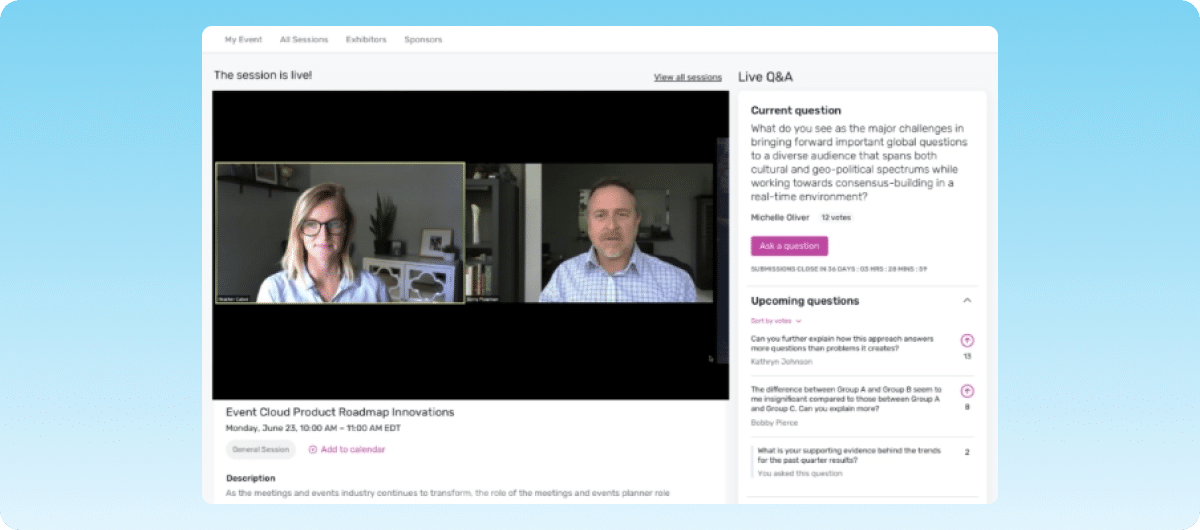
It’s especially popular for corporate summits, academic conferences, and association events where security, scale, and customization really matter.
Key Features
- Custom registration: Set up ticket types, waitlists, access levels, and custom workflows for different attendee groups.
- Engagement tools: Keep audiences involved with live chat, polls, Q&A, surveys, and gamification.
- Sponsor & Exhibitor support: Offer branded virtual booths with lead capture and engagement tools.
- Advanced reporting: Get real-time data on session attendance, engagement, and ROI.
- CRM integrations: Easily connect with Salesforce, HubSpot, Marketo, and other marketing tools.
Pros
- Built for enterprise-level virtual and hybrid events
- Strong security and compliance for regulated industries
- Scales easily for global, multi-session events
- Seamless integrations with CRM and marketing platforms
Cons
- Steeper learning curve compared to simpler platforms
- Setup can be time-consuming without tech support
- It may be too complex for small teams or one-off events
5. Eventbrite
If you’re planning a virtual workshop, meetup, or webinar and want something quick and simple, Eventbrite is one of the easiest platforms to get started with. It’s ideal for creators, educators, nonprofits, and small businesses that want to launch virtual events without dealing with complex tech.
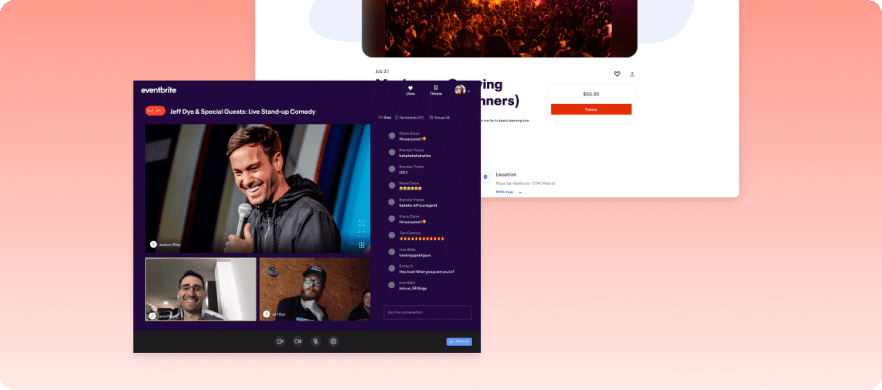
You can integrate Eventbrite with popular streaming tools like Zoom, Microsoft Teams, or YouTube Live, so hosting your session is straightforward and flexible. It handles registration, ticketing, and event promotion all in one place.
Key Features
- Quick Setup: Create branded pages with easy event registration and ticketing in just a few steps.
- Live Interaction: Event attendees can participate actively in live networking activities throughout the event.
- Promotion Tools: Boost attendance with email campaigns, discount codes, and social sharing.
- Real-Time Analytics: Track ticket sales, page views, and audience behavior as your event unfolds.
- Mobile-Friendly: Attendees can register, pay, and join your event from any device.
Pros
- Great for ticketed events, webinars, and small events
- Built-in promotional tools with email reminders and social sharing
- No upfront cost for free events
- Event discovery tools help attendees find local events worldwide
Cons
- Limited support for hybrid or multi-day virtual events
- Transaction fees can add up for high-ticket or large-volume events
- Not ideal for complex or large-scale virtual conferences
6. Whova
Whova is an event management platform offering tools to help you plan and run a virtual event that boosts attendee engagement and fosters networking. It’s great for conferences, academic events, and association meetings where participation and networking matter as much as the content itself.
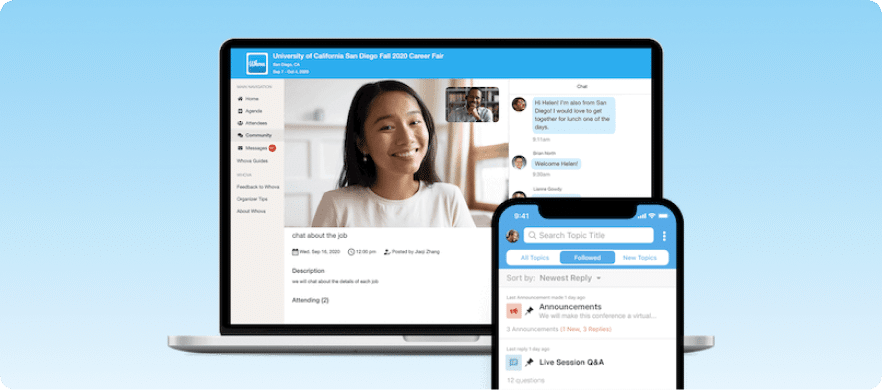
The platform helps you manage everything from live sessions and virtual booths to interactive agendas, discussion boards, and even icebreaker games, all from one easy-to-use dashboard. Organizers can schedule sessions, update speaker details, and send announcements in real time.
Key Features
- Interactive Agendas: Let attendees build personal schedules and join sessions straight from the app.
- Streaming Integrations: Easily connect with Zoom, YouTube Live, or Vimeo to deliver your sessions.
- Audience Engagement: Encourage interaction with meetups, message boards, photo contests, and 1:1 messaging.
- Sponsor & Exhibitor Support: Set up virtual booths with lead capture and branded content.
- Mobile Access: Attendees can view schedules, connect, and stay updated right from their phone.
Pros
- Strong attendee networking and interaction features
- Great for academic, association, and community-driven events
- Easy setup for virtual sessions and speaker info
- Useful for both one-off and recurring events
Cons
- Limited options for customizing branding and layouts
- Not built for high-production or multi-track virtual events
- Reporting and analytics may be less detailed than other platforms
7. Hubilo
Hubilo positions itself as an engagement-first virtual event platform, and for good reason. It’s designed to help you build deeper connections between attendees and speakers.
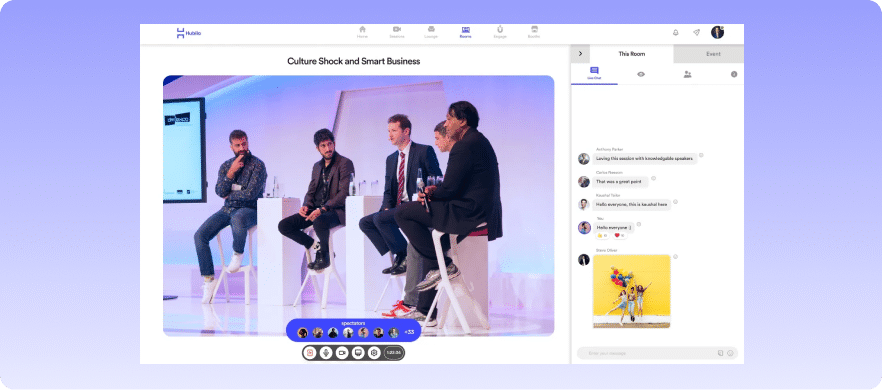
The platform focuses on real-time interaction. From live polls and gamification to 1:1 networking and branded breakout rooms, every part of the experience is built to keep people engaged, not just logged in.
Key Features
- Branded Virtual Stages: Host live sessions with customizable backdrops and sponsor placements.
- Networking Features: Offer 1:1 video meetings, AI matchmaking, and group discussions to help attendees connect.
- Sponsor & Exhibitor Support: Set up branded booths with downloadable content and lead capture tools.
- Analytics Dashboard: Track attendance, engagement, and interactions in real time.
- CRM Integrations: Easily connect with platforms like Salesforce, HubSpot, and Marketo.
Pros
- Interactive features keep the audience engaged at all times
- High level of branding and customization for different event types
- Supports unlimited attendees on its enterprise plans.
- Reliable lead tracking and CRM integration for post-event follow-up
Cons
- No option to undo or revert once the data is uploaded
- Some customization tools, like the landing page builder, are limited
- It can feel overwhelming to navigate for first-time users
8. Canapii
Canapii is a flexible virtual event platform for teams that need to manage global events with ease. It’s a great fit for corporate meetings, product launches, and international conferences, especially when you want a smooth experience without relying on multiple tools or large in-house tech teams.
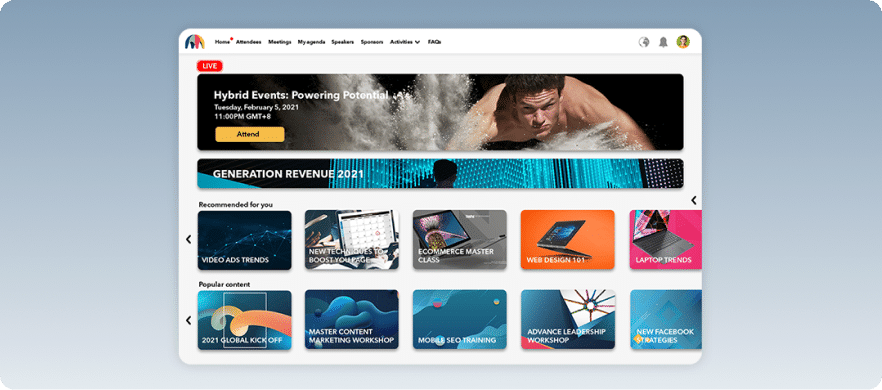
From speaker onboarding and AI-powered translations to branded event spaces and post-event analytics, everything is built in. This is especially useful for events that span different time zones or require multi-language support, offering a seamless experience for both organizers and attendees.
Key Features
- Branded Virtual Venue: Customize session pages, lobbies, booths, and sponsor spaces to match your brand.
- Gallery Pages: Let attendees post photos and videos, join group chats, and connect around creative or activity-based sessions.
- Meeting Scheduling: Control who can book meetings and when. Attendees can schedule 1:1 video calls directly through the platform.
- AI Subtitles & Translations: Support for 50+ languages with real-time subtitles and pre-translated on-demand content.
- Automated Emails: Send confirmations, meeting invites, and reminders triggered by attendee activity.
Pros
- Excellent international support with AI-powered translations
- Unique engagement tools like gallery pages and smart scheduling
- Built-in production and speaker support
- Ideal for branded, large-scale, or multi-time-zone events
Cons
- Day-of-production support isn’t included by default
- It may be too advanced for small or simple events
- Limited customization for reports.
9. Accelevents
Accelevents is a flexible event management software built to support virtual events, from small webinars to large conferences and trade shows. It combines ease of use with powerful features, making it a solid choice for both new event organizers and experienced teams running more complex events.
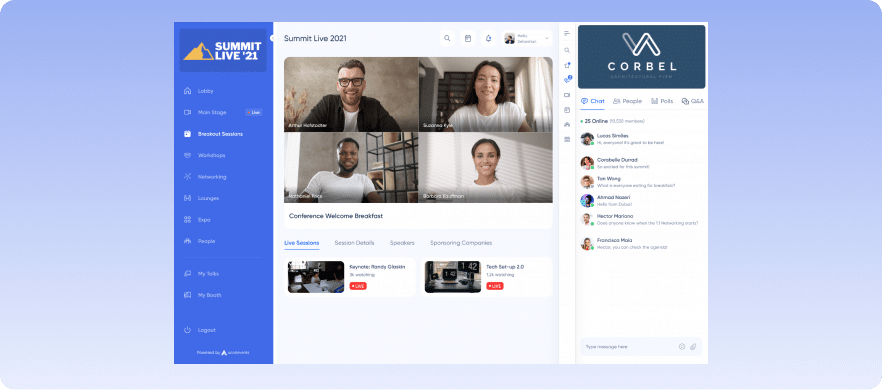
It’s especially strong in corporate training, professional development, and industry-specific conferences across sectors like healthcare, education, tech, and finance.
Key Features
- Multi-Track Events: Host multiple sessions, keynotes, and breakout rooms at the same time.
- Virtual Expo Hall: Set up interactive booths with live chat, downloadable content, and lead capture.
- Built-In Ticketing: Sell tickets directly through the platform with flexible pricing and discount options.
- Lead Capture & Scoring: Give sponsors tools to collect, track, and qualify leads in real time.
- CRM Integrations: Easily connect with HubSpot, Salesforce, Marketo, and other marketing platforms.
Pros
- Responsive customer support during setup and live events
- Built-in engagement tools like chat, polls, and exhibitor booths
- All-in-one platform with ticketing, streaming, and analytics
- Real-time reporting to track attendee activity and performance
Cons
- Limited design flexibility for users who want advanced customization
- Some features may be tricky to use without training
- Building an event may be overwhelming for new users.
10. EventMobi
EventMobi is a flexible virtual event platform that gives organizers full control over branding, engagement, and content delivery. It’s a great fit for mid-sized conferences, internal meetings, and association events where personalization and attendee experience are key.
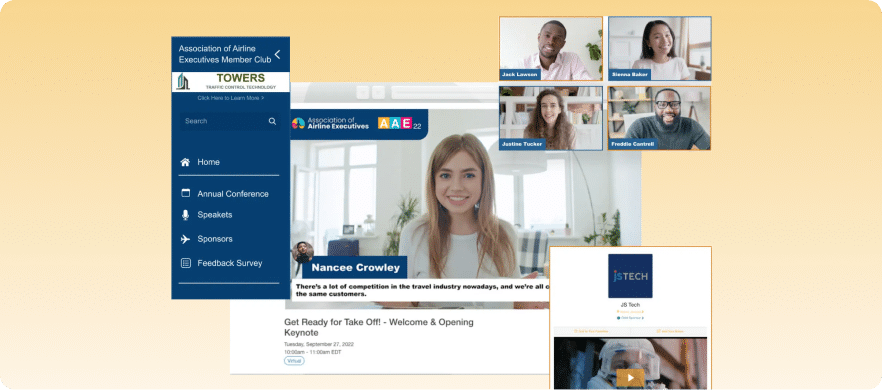
The platform lets you build a fully branded virtual venue with custom pages, personalized schedules, and sponsor spaces all designed to keep attendees connected and engaged.
Key Features
- Custom Virtual Spaces: Build your own event hub with sponsor areas, session pages, and breakout rooms.
- Branded Mobile App: Offer a seamless experience for both virtual and in-person attendees with fully branded apps.
- Built-In Production Studio: Livestream sessions or blend pre-recorded and live content without needing third-party tools.
- Real-Time Engagement: Use polls, interactive quizzes, and surveys to keep attendees involved throughout the event.
- Cross-Channel Analytics: Track engagement across virtual and in-person touchpoints to improve future events.
Pros
- Comprehensive all-in-one platform with no hidden fees
- Highly customizable branding with drag-and-drop flexibility
- Strong engagement features and simple mobile tools
- Excellent customer support and professional services
Cons
- Entry-level pricing may be high for smaller events.
- Some features (like streaming and badge printing) are add-ons.
- Attendees occasionally report login issues and in-app navigation challenges.
Host seamless & engaging virtual events with EventsAir
Not every virtual event platform is built the same. Some are perfect for small teams running webinars. Others power multi-day global conferences. The best choice depends on your goals, audience, and internal capacity.
If you need an all-in-one platform that handles registration, streaming, engagement, and post-event insights for both small-scale events and global multi-day conferences, EventsAir is built for you. From engaging virtual environments to mobile apps and analytics, we give you the control and flexibility to deliver seamless, engaging events at any scale.
Ready to simplify your next virtual event? Book a demo with us today!
Product Comparison
See EventsAir in action
Discover why 12,000+ event professionals trust EventsAir to deliver effortless events, every time.


